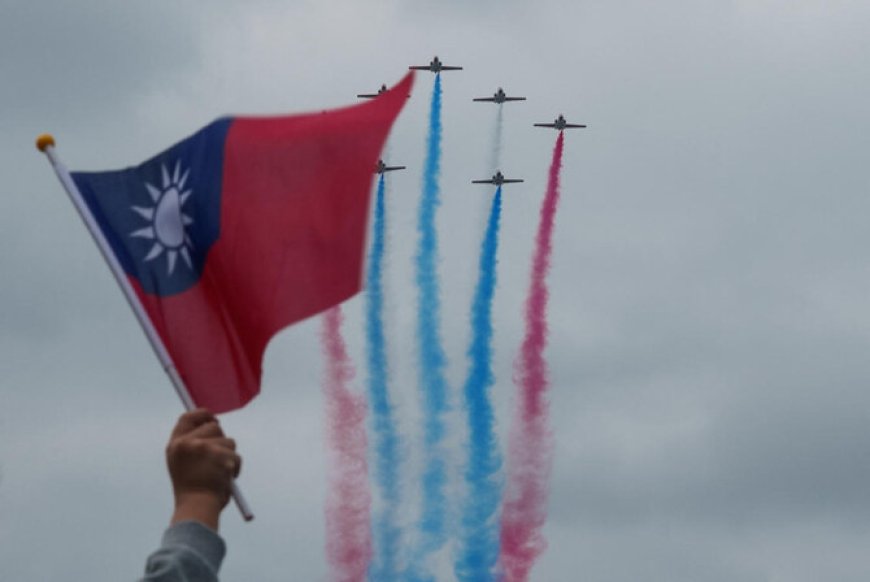China Threatens Taiwan with Additional Trade Sanctions After Presidential Address
China declared on Saturday that it is investigating more economic actions against Taiwan in a fresh escalation of cross-strait tensions. Two days after Beijing aggressively attacked a speech given by Taiwan's President Lai Ching-te, this action highlights even more the delicate situation of ties between the two administrations.

China declared on Saturday that it is investigating more economic actions against Taiwan in a fresh escalation of cross-strait tensions. Two days after Beijing aggressively attacked a speech given by Taiwan's President Lai Ching-te, this action highlights even more the delicate situation of ties between the two administrations.
Reiterating what it believes to be Taiwan's ongoing trade restrictions against mainland China, the Chinese Ministry of Commerce said that pertinent ministries are looking at possible responses. "At present, relevant departments are studying further measures based on the conclusions of the investigation on trade barriers from Taiwan," the ministry stated in an official statement on its website. Although particular specifics of these possible policies were not revealed, analysts believe that tariffs or other economic penalties could be applied shortly.
Cross-Strait Bonds at a Boiling Point
Though Taiwan runs as an independent state with its own government, economy, and military, China has long regarded this self-governing democracy as a natural part of its territory. Any attempt to demonstrate Taiwan's autonomy by the People's Republic of China directly challenges its sovereignty. This is especially true with the Democratic Progressive Party (DPP) rule of Taiwan and its leaders, including President Lai Ching-te, whom Beijing has labelled as a "separatist."
President Lai found a mix between diplomacy and rigidity in his Thursday National Day speech. He underlined Taiwan's stance that the People's Republic of China has no right to represent Taiwan, but he also extended an olive branch emphasizing Taiwan's readiness to cooperate with Beijing on world issues including climate change. Lai said, "Taiwan is willing to work with China on issues of mutual concern; but, the Taiwanese people alone will decide the future of Taiwan."
China answered with quickness and ferocity. Deepening a divide already widening since Lai assumed office, the Taiwan Affairs Office accused him of encouraging confrontation and pushing "separatist ideas." The revelation by the trade ministry on Saturday heightened concerns about Beijing's intended additional economic retribution.
Economic Arsenal in a Political Conflict
China has not only applied economic pressure once to change the political scene of Taiwan. China restored duties on 134 Taiwanese goods in May 2024, claiming that under a past trade agreement Taiwan had not reciprocated. Originally signed in 2010 with an intention of strengthening stronger economic connections between the two sides, that accord is the Cross-Strait Economic Cooperation Framework accord (ECFA).
Although the ECFA was considered as a means of reducing tensions by encouraging trade, it has now turned into a battlefield for political clout. Many Taiwanese officials and observers feel that Beijing's ultimate aim is to punish Lai's government by progressively destroying the preferential terms set out in the ECFA, therefore undermining Taiwan's economy and, hence, its political will.
China's approach matches its more general plan of using military posturing combined with economic strategies to push Taiwan. Particularly as Taiwan gets ready for its next presidential contest in January 2024—a contest in which Lai is a major contender—the possibility of fresh tariffs or trade restrictions looms huge.
Worldwide Consequences
The growing trade conflict between China and Taiwan arises within more general geopolitical changes. Particularly over problems like human rights, technology competition, and Beijing's increasing aggressiveness in the Indo-Pacific area, relations between China and the vital ally Taiwan have drastically soured in recent years. To much China's annoyance, the U.S. has been increasing weaponry sales to Taiwan and bolstering diplomatic assistance.
Simultaneously, the world is observing attentively how China and Taiwan negotiate their differences, especially in terms of supply chains and technological innovation. Taiwan is a major participant in the worldwide semiconductor market, hence any disturbance in its economy could have broad effects.
Taiwan's future seems more closely entwined in both regional and global power dynamics as China keeps raising its pressure. How far Beijing will go in its economic crackdown—and how Taipei and her friends abroad will react—remains to be seen.













































